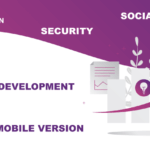Mobile App Ventures: With smartphone usage rising, and mobile data services becoming cheaper, the popularity of mobile apps is rising steadily. They are becoming an essential part of all business activities from shopping to entertainment, hospitality to transport.
Apps are being used by both large and small start-ups who are interested in delivering customized value-added services for their customers.
The mobile apps are also very useful for continued and sustained which is not possible in other forms of marketing strategies.
Therefore, it is crucial for most service providers, for whom customer loyalty is the most crucial element. They are even able to integrate with other platforms like social media and e-payment services in order to enhance the experience of their users.
The app development industry is therefore on an upward trend, and therefore requires a lot of innovation to make the most of this momentum.
These are not only technological innovations like better UI, or better data processing capacity, but it requires innovation in the managerial and financial model for this sector to scale up further and reach out far and wide.
Stagnancy within the present system – Mobile App Ventures
Now that you recognize the opportunities in this sector, it is essential to look at a major problem within the sector, so that you will be able to understand how a franchise model can alleviate these problems.
Apps are generally a component of a larger business process. Most companies are able to either develop apps in-house or are able to hire the expertise on an ad-hoc for the specific task of developing upgrading, and maintenance of apps.
However, given the cost of the human resources required for developing mobile apps, it is often beyond the reach of small businesses. Mobile App Ventures, As a result, not only does the industry hit a wall, it’s capacity to absorb more new talent within the sector becomes limited.
In the next few sections of this article, we will explain, how a franchisee model can help the industry deal with both of these problems, as well as how would such a system can be organized by entrepreneurs.
How can a franchise model deal with stagnancy?
Franchise models have been known for increasing better reach to customers of retail brands while reducing the cost of operation for the parent company.
This also reduces liability for them. Franchises also allow small entrepreneurs to benefit from the reputation of existing brands while being able to maintain a certain degree of autonomy over their operations.
Eventually, the customers can benefit from this arrangement by having access to the products at a lower cost with a certain degree of assurance about the quality of the products as they are monitored by the parent company on many parameters.
In this way the arrangement allows a larger customer base, allowing the company to spread into untapped markets. And also allows greater investment of time and energy into the sector and therefore scaling up, the case of Mc. Donald is the most famous example of this in the fast-food sector.
In recent years there has been a boom in the pool of human resources capable of developing high-end apps. The boom has been fueled largely by the easy access to online courses and other educational resources on technologies.
These actors can become owners of the franchises, while the parent company can provide larger oversight and advertising facilities.
And these franchises will be in the best position to reach out to newer markets with the understanding of the specific contexts and their specific demands, therefore creating newer avenues for growth.
Rough prototypes for a franchise model in the mobile app sector, the franchise model can firstly take the franchise approach to app development, where the app developers (individual or groups) can become franchise owners of the parent company, and they may directly expand the business by catering to a large base of client businesses for whom they develop apps and provide app-related services.
In this model the revenue sharing principle would be pretty straightforward, the franchise owners would be paying a percentage of their revenues to the parent company for using their services.
If there are other services like data storage or technical support which is centralized with the parent company, there can be a specific arrangement for utilizing and bearing the cost between the two parties.
However, such arrangements will most likely be standardized by the parent company to avoid discrepancies.
Another way how a franchise model can be designed in the sector is on the product side. If your venture works on an app-based platform and acts as an intermediary between businesses and clients, this form of franchise model can be a great way of gaining more customer loyalty.
Here as the parent company, you only sell the brand name to existing businesses, whether in the hospitality, transport, retail or any other sector. These businesses can now be consolidated under this brand.
They will have to provide standardized services and will also be able to use the mobile app platform, and make customizations and specifications according to their requirements, however, the overall platform will still be owned by the parent company.
The revenue-sharing arrangement for this model will involve a complex set of rules on how different services will be paid for by the franchise owner as they are dependent on the parent company for many different services, which too will be customized for different contexts within which these franchises operate.
Innovation is key
In conclusion, it must be reinstated that innovation is the key to the success of various business arrangements in the sector.
While these are only two examples of how a franchise model can work in the sector, it is only through more innovative models which have the key idea of franchises, that can help the sector scale up and get out of the stagnation trap that it might run into in the future.
Read More: A-Z OF BUILDING SUCCESSFUL HOTEL BOOKING APP IN 2021
























